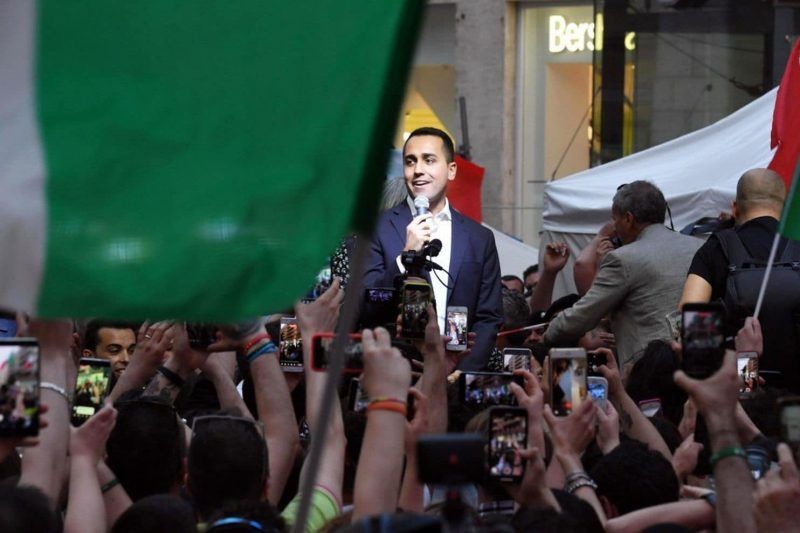
“The wind is back in Europe’s sails,” European Commission President Jean-Claude Juncker announced last September. “The 21st century will be the [European Union’s] century,” Antonio Tajani, the head of European Parliament, predicted confidently earlier this month.
One wonders whether they are still as confident today, amid a panic in financial markets triggered by the government crisis in Tajani’s homeland of Italy, which has investors worrying about a possible Italian exit from the euro zone. Once again, the entrenched optimism of European elites stands in stark contrast with the continent’s grim reality. If the Brexit vote and Donald Trump’s election in the United States shook the continent’s leaders to their core, most failed to draw the right lessons. Instead of engaging in a deep rethink of the European project, they took Emmanuel Macron’s electoral victory in France as a sign that the crisis was over and that it was safe to return to business as usual.
The E.U.’s chronic complacency, both in rhetoric and in policy practice, is dangerous.
Take populism. Although Macron defeated Marine Le Pen, more than 40 percent of the French electorate voted for extremist candidates in the first round of the presidential election. Across Europe, authoritarian populists on the far right and the far left doubled their vote share between 1997 and 2017. Their rise shows no signs of receding.
European officials like to point out that the E.U. is the largest economy in the world, back on a growth trajectory after a protracted debt crisis. But the data actually suggest a slowdown, with quarterly growth of just 0.4 percent. The prospect of a trade war with the United States and the unresolved trade relationship with the United Kingdom post-Brexit are hardly encouraging. Although Macron has succeeded in pushing through a partial liberalization of France’s sclerotic labor markets, Germany has not seen any structural reforms since Angela Merkel’s arrival in power in 2005 and seems overdue for an economic downturn.
Yet the bloc’s draft budget for 2021-2027, unveiled in early May, reflects the belief that, save perhaps for marginal tweaks, the E.U.’s architecture is fundamentally sound. The Multiannual Financial Framework, which will guide the E.U.’s spending priorities for much of the next decade, vows “to reflect the new reality” by allocating more resources to border protection (less than 3 percent of the overall budget) and research and innovation (less than 8 percent). But a solid two-thirds of the budget is dedicated to legacy spending areas, such as redistribution to poorer member states and agricultural subsidies.
Most acutely, the debt-to-GDP ratios still linger close to 180 percent in Greece and more than 130 percent in Italy and Portugal. Although the new Italian coalition of the populist Five Star Movement and the nationalist Northern League do not intend to leave the common currency, neither are they keen to get Italy’s fiscal house in order. The new prime minister, Carlo Cottarelli, an acclaimed expert on fiscal consolidations, lacks the democratic mandate to do what is necessary. Cementing the impasse further, Berlin remains adamantly opposed to sharing debt burdens throughout the euro zone, which could have provided an alternative avenue (though not without risks of its own) for reducing the crippling debt loads on the Mediterranean periphery.
Although European leaders concur that the continent cannot rely on U.S. protection anymore, few act accordingly. Other than the United Kingdom, only Greece and Estonia met NATO funding targets last year. With hollowed-out defense budgets, initiatives such as the Permanent Structured Cooperation (PESCO), which provides for common military projects, will remain a facade.
To the dismay of Eastern Europeans, Germany is keen to normalize its relations with Russia. Macron’s recent visit to St. Petersburg could provide a similar opening for France. Not only is the E.U. resisting a new round of sanctions against Russia, but the looming completion of the Nord Stream 2 pipeline will make the continent even more dependent on Russian energy.
Similarly, the bloc lacks a strategy for dealing with conflicts in the Middle East, other than a die-hard commitment to the Iran nuclear deal and a quixotic faith in the viability of the Turkey-E.U. agreement on refugees. Should the region see another major conflagration, the E.U. is no better prepared to cope with the resulting wave of migration than in 2015, when the combination of a chaotic refugee influx and jihadi terrorism provided fertile ground for vitriolic, divisive politics.
What is left are appeals to the E.U.’s shared values. But those would have been more convincing if Hungarian Prime Minister Viktor Orban — a member of the same family of conservative political parties as Merkel — had not declared that the era of liberal democracy was over. The E.U. wields scarcely any instruments that would enable it to sanction (much less expel) members that are sliding down the path of authoritarianism.
To be sure, not everything is doom and gloom in Europe. Yet any sober look shows that its respite from the crises that had tormented it for almost a decade was at best temporary. As fresh storms gather, the instinctive yearning of European leaders for a reassuring status quo leaves the continent woefully ill-prepared for what is to come.
Dalibor Rohac is a research fellow at the American Enterprise Institute in Washington.
